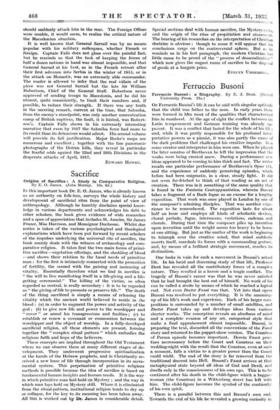Sacrifice
Origins of Sacrifice : A Study in Comparative Religion. By E. 0. James. (John Murray. 10s. 6d.) Is this important book Dr. E. 0. James, who is already known as an authority on folk-lore, surveys the whole history and development of sacrificial rites from the point of view of anthropology. Although he humbly disclaims special know- ledge in various departments and acknowledges his debt to other scholars, the book gives evidence of wide researchei and a span of appreciation that includes St. Anselm, Sir James Frazer, Miss Harrison, and Monsignor Duehesne. Whilst due notice is taken of the various psychological and theological explanations which have been put forward by recent scholars of the impulses underlying the universal rite of sacrifice, the book mainly deals with the witness of archaeology and com- parative religion. It takes first the two main forms of primi- tive sacrifice—vegetation offerings, and the shedding of blood —and shows their relation to the basal needs of primitive man : for the first is intimately connected with the promotion of fertility, the second with the gaining and increasing of vitality. Essentially therefore what we find in sacrifice is " the will to live manifesting itself in a life-giving and a life= getting ceremonial." The killing of the victim, so often regarded as central, is really secondary : it is to be regarded as " the giving of life to promote or preserve life." The death of the thing sacrificed is simply a means of releasing the vitality which the ancient world believed to reside in the blood : (a) in order to augment the power and activity of the god ; (b) to give new life and power to the worshipper and " cover " or annul his transgressions and frailties ; (c) to establish or renew a covenant or communion between the worshipper and the object of worship. In a fully-developed sacrificial religion, all these elements are present, forming together the " complex ritual pattern " which embodies the religious faith and hope of the believers.
These concepts are implied throughout the Old Testament where we can observe them at many different stages of de- velopment. They underwent progressive spiritualization at the hands of the Hebrew prophets, and in Christianity re- ceived a new lease of life through incorporation in its sacra- mental system. This perpetuation of primitive religious methods is possible because the idea of sacrifice is based on fundamental human insights and human needs. It is the way in which primitive man laid hold on Mystery ; and the way in which man lays hold on Mystery still. Where it is eliminated from the ritual-pattern, institutional religion tends to dry up or collapse, for the key to its meaning has been taken away. All this is worked out by Dr. James in considerable detail. Special sections deal with human sacrifice, the Mystery-cults, and the origin of the rites of propitiation and atonement. The bearing of his researches on the interpretation of Christian doctrine is obvious ; though to some it will appear that his conclusions verge on the controversial sphere. But as he reminds us in his last paragraph, the modern Christian has little cause to be proud of the " process of desaeralization " which now gives the august name of sacrifice to the disposal of goods at a bargain price.
EVELYN UNDERHILL.








































 Previous page
Previous page